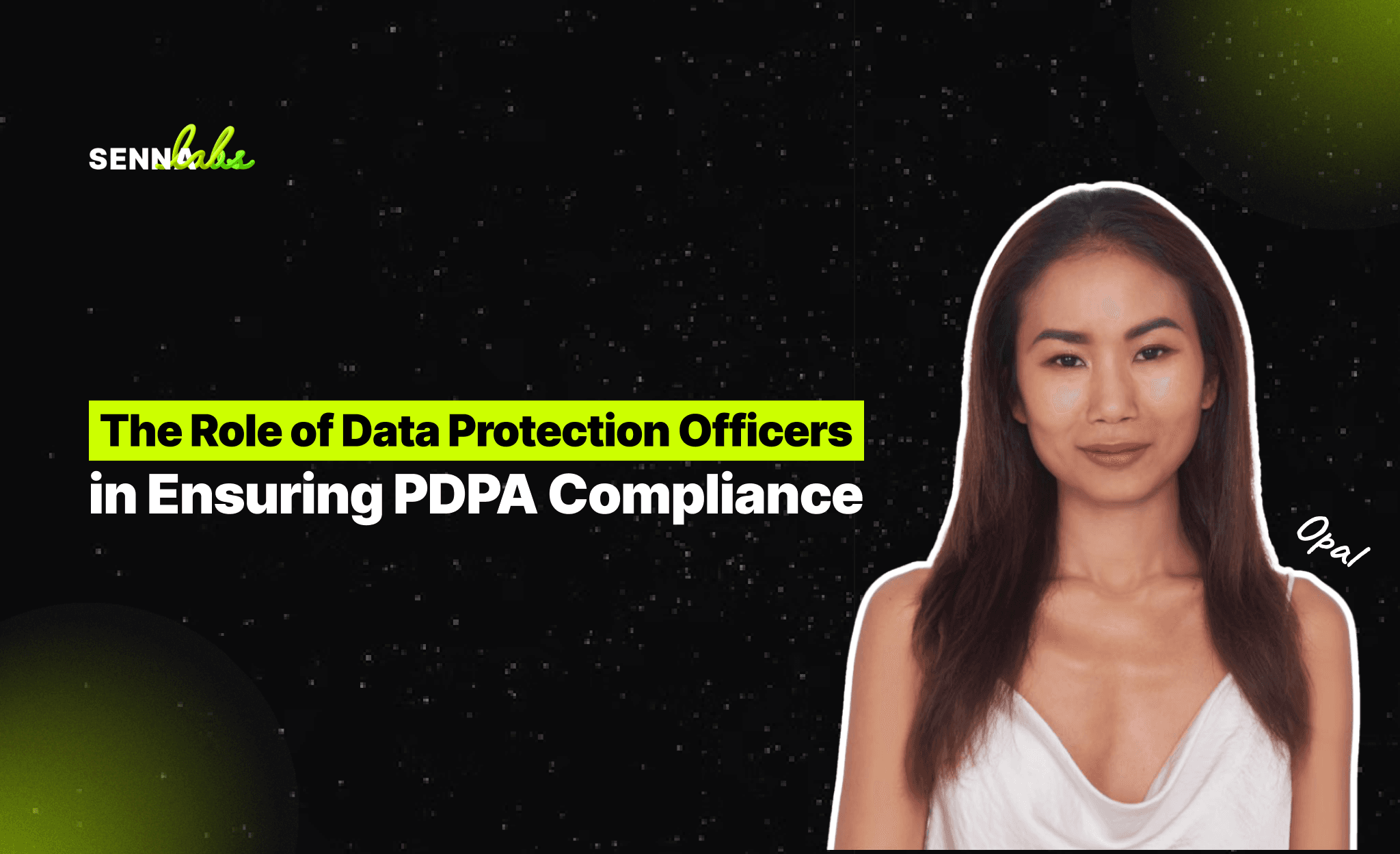The Role of Data Protection Officers in Ensuring PDPA Compliance
Share

As businesses increasingly handle sensitive personal data, ensuring compliance with data protection regulations such as the Personal Data Protection Act (PDPA) has become a critical priority. One key component of maintaining compliance is appointing a Data Protection Officer (DPO)—an individual responsible for overseeing data protection strategies and ensuring that the organization adheres to the law.
In many organizations, especially those that process large volumes of personal data, appointing a DPO is not only recommended but often required under data protection laws. A DPO helps guide the organization through the complexities of data privacy regulations, ensures proper handling of personal data, and mitigates the risks of non-compliance.

This article explores the role of Data Protection Officers in ensuring PDPA compliance. We’ll discuss their key responsibilities, why they are crucial to modern businesses, and how a DPO can significantly reduce the risk of data breaches and legal penalties. Additionally, we will review a real-world use case where the appointment of a DPO helped a retail chain streamline its data management processes, reducing the risk of non-compliance and associated fines by 50%
What Is a Data Protection Officer (DPO)?
A Data Protection Officer (DPO) is a designated individual within an organization responsible for overseeing its data protection policies and ensuring compliance with data protection regulations like the PDPA. The DPO’s role is to serve as a liaison between the organization, regulatory authorities, and individuals whose data is being processed.
DPOs must have a strong understanding of data protection laws and the technical and organizational measures necessary to secure personal data. They are typically appointed in organizations that process large amounts of personal data, such as retail chains, financial institutions, healthcare providers, and tech companies.
Under PDPA, the appointment of a DPO may be required depending on the nature and scope of the organization's data processing activities. Even when not mandated by law, many organizations choose to appoint a DPO as a proactive step toward maintaining compliance and protecting personal data.
Why Appointing a DPO Is Critical for PDPA Compliance
PDPA compliance is complex and requires ongoing vigilance in managing personal data. Here’s why appointing a DPO is essential for businesses striving to ensure compliance:
1. Centralized Oversight of Data Protection
A DPO provides centralized oversight of all data protection activities within the organization. By having a dedicated individual responsible for monitoring compliance, businesses can ensure that their data protection policies are consistently followed across all departments. The DPO acts as the main point of contact for data protection matters, reducing the likelihood of miscommunication or oversight.
2. Expertise in Data Protection Law
Navigating data protection regulations like the PDPA requires specialized knowledge. A DPO brings legal and technical expertise to the organization, ensuring that the company fully understands its obligations under the law. DPOs can interpret complex regulations, identify potential areas of non-compliance, and recommend corrective actions.
3. Risk Mitigation
One of the primary functions of a DPO is to identify risks associated with the organization’s data processing activities. This includes conducting data protection impact assessments (DPIAs) to evaluate potential risks to personal data and recommending measures to mitigate those risks. By addressing vulnerabilities before they lead to data breaches, a DPO helps minimize the risk of legal penalties and reputational damage.
4. Communication with Regulatory Authorities
The DPO acts as the liaison between the organization and regulatory authorities responsible for enforcing data protection laws. In the event of a data breach, the DPO is responsible for reporting the incident to the relevant authorities within the required timeframes. This ensures that the organization meets its legal obligations and mitigates the risk of fines for non-compliance.
5. Building a Culture of Data Privacy
A DPO plays a key role in fostering a culture of data privacy within the organization. By raising awareness about the importance of data protection and providing training to employees, the DPO helps ensure that staff understand their responsibilities when handling personal data. This proactive approach reduces the risk of human error, which is one of the most common causes of data breaches.
Key Responsibilities of a Data Protection Officer
The role of a DPO is multifaceted and involves a wide range of responsibilities aimed at ensuring PDPA compliance. Below are some of the key responsibilities of a DPO:
1. Monitoring Compliance
The DPO’s primary responsibility is to monitor the organization’s compliance with PDPA and other data protection regulations. This includes reviewing internal data protection policies, conducting audits, and ensuring that personal data is processed lawfully, transparently, and securely.
2. Conducting Data Protection Impact Assessments (DPIAs)
DPIAs are assessments designed to identify risks to personal data in new or existing data processing activities. The DPO is responsible for conducting these assessments and advising the organization on how to mitigate any identified risks. DPIAs are particularly important when introducing new technologies or processing large amounts of sensitive personal data.
3. Advising on Data Protection Policies
The DPO advises the organization on the development and implementation of data protection policies, ensuring that these policies align with PDPA requirements. This includes advising on best practices for data collection, storage, sharing, and disposal, as well as ensuring that employees are aware of their responsibilities.
4. Training Employees
The DPO is responsible for educating employees about data protection practices and the organization’s obligations under PDPA. This includes providing regular training sessions, updating staff on changes to data protection laws, and ensuring that employees know how to handle personal data securely.
5. Responding to Data Breaches
In the event of a data breach, the DPO is responsible for coordinating the organization’s response. This includes investigating the breach, notifying the relevant regulatory authorities within the required timeframes, and informing affected individuals if their personal data has been compromised. The DPO also advises on steps to prevent future breaches.
6. Liaising with Regulatory Authorities
The DPO serves as the main point of contact between the organization and regulatory authorities. This includes responding to inquiries from regulators, submitting reports, and ensuring that the organization cooperates fully with any investigations into data protection practices.
The Impact of Appointing a DPO: A Real-World Use Case
To understand the tangible benefits of appointing a DPO, let’s look at a real-world example where a retail chain successfully implemented a DPO to oversee PDPA compliance.
The Problem:
A retail chain with operations across multiple regions was struggling to manage its data protection obligations. The company processed large volumes of customer data, including names, addresses, and payment information. Without a dedicated data protection officer, the company faced challenges in ensuring compliance with PDPA, leading to inefficiencies in data handling and an increased risk of data breaches.
The Solution:
Recognizing the need for centralized oversight of data protection, the company appointed a DPO to manage its PDPA compliance efforts. The DPO’s responsibilities included conducting regular data audits, advising on secure data handling practices, and implementing a company-wide training program on data protection.
The Results:
Within six months of appointing a DPO, the retail chain experienced significant improvements in its data management processes. The DPO helped streamline the company’s data protection policies, ensuring that customer data was collected, stored, and processed in compliance with PDPA. The company also saw a 50% reduction in the risk of fines for non-compliance, as the DPO ensured that data breaches were reported promptly and that corrective actions were taken to prevent future incidents.
The appointment of a DPO not only improved the company’s compliance with PDPA but also enhanced its reputation for data privacy. Customers appreciated the company’s commitment to protecting their personal information, leading to increased trust and loyalty.
Benefits of Having a DPO
Appointing a DPO offers several key benefits for organizations striving to maintain PDPA compliance:
1. Reduced Risk of Non-Compliance
A DPO ensures that the organization adheres to all PDPA requirements, reducing the risk of legal penalties for non-compliance. By implementing best practices for data protection and monitoring compliance, the DPO helps the organization avoid fines and legal disputes.
2. Improved Data Security
With a DPO overseeing data protection efforts, organizations can identify and address vulnerabilities in their data processing activities. This proactive approach reduces the likelihood of data breaches and strengthens the overall security of personal data.
3. Faster Incident Response
In the event of a data breach, a DPO can coordinate the organization’s response, ensuring that the breach is reported promptly and that steps are taken to mitigate the damage. This helps the organization comply with PDPA’s breach notification requirements and minimize the impact on affected individuals.
4. Enhanced Customer Trust
Customers are more likely to trust organizations that prioritize data privacy. By appointing a DPO and demonstrating a commitment to protecting personal data, businesses can build stronger relationships with their customers and enhance their reputation.
5. Streamlined Data Management
A DPO helps streamline data management processes, ensuring that personal data is collected, processed, and stored efficiently. This reduces the risk of errors, improves operational efficiency, and ensures that data protection practices are consistently followed across the organization.
Conclusion
In the era of stringent data protection regulations, appointing a Data Protection Officer (DPO) is essential for organizations that handle large volumes of personal data. A DPO provides the expertise and oversight needed to ensure compliance with PDPA, reduce the risk of data breaches, and build a culture of data privacy within the organization.
By taking responsibility for data protection policies, conducting audits, training employees, and responding to data breaches, the DPO plays a critical role in safeguarding personal data and minimizing the risks of non-compliance. For organizations looking to enhance their data protection efforts, appointing a DPO is a proactive and effective step toward ensuring PDPA compliance.

Share
